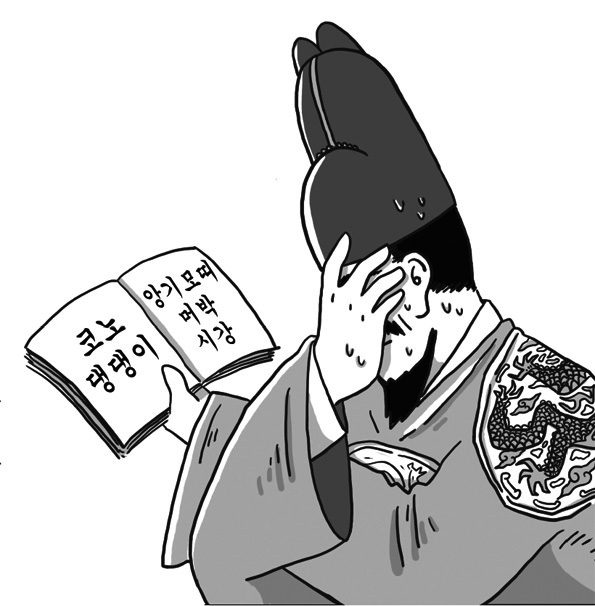
엄카, 시강, 띵작, 커엽다, and 댕댕이. How many new words do you know among these five? These words are newly-coined words which are particularly prevalent in teens and twentysomethings’ daily lives. ‘엄카’ and ‘시강’ mean ‘mother’s card’ and ‘catching one’s eyes’ respectively. They are abbreviations. 띵작 and 커엽다 are called 야민정음, which are pretty much the same as 명작(masterpiece) and 귀엽다(cute). If you have no knowledge about neologisms, you will not understand your friends new slang.
프사(profile photo), 브금(B.G.M.), and 코노(coin karaoke). These shortened words are also abbreviations called acronyms. They are exactly the same as T.G.I.F.(Thank God, It’s Friday), L.O.L.(Laugh Out Loud), and R.I.P(Rest In Peace) where the 1st letter of each word makes a new word. The shortened words are used for quickly conveying what you want to say, but now they are gradually becoming a tendency in all sentences. They have been popular since the 2000s, but now they have gone beyond just taking the first syllables of words. After too many slang words arose, ‘별다줄’ was coined. This means ‘to shorten all kinds of things.’
야민정음’s exact origin is not well known, but it started on the website D.C. Inside Domestic Baseball Gallery in 2014. This is a combination of the words ‘baseball gallery’ and ‘Hunminjeongeum’, which means to change the letters of a word into letters with similar shapes. The examples are 띵작, 커엽다, and 댕댕이. According to a media survey conducted to see if young people are using the correct Hangeul, six out of ten people use abbreviations and coinages every day. 55% of the respondents(2,671) responded that they care about spelling and verbal expressions but habitually use slang, and 5% of the respondents(299) preferred to use new words rather than correct expressions. The reasons for using these words were common usage among friends, the lengthiness of the correct expressions, the fun of using slang, and trendiness. In fact, Kim Bum-bae (’17, Dept. of Wood and Paper Science) said, “I use too many new words like 댕댕이, 띵작, and 케바케. Such words are used for fun and a colorful replacement of traditional language. Also, I feel outdated if my friends use new words and I don’t.”
However, as using new words is becoming more common, the controversy over this is also continuing. There are two differing views on this phenomenon. One is the idea of preserving the existing system by considering the coined words as a destruction of Hangeul, and the other is that coined words are just a tendency to play with words. Those who think negatively about the emergence of coined words worry that they might be used as vulgar language, and they argue that just seeking new words as a sort of a game will break the social promise of linguistics. Moreover, they take a dim view of these words because it can cause exclusion from people who aren’t familiar with the terms. Newly coined words are not widespread and often disappear. On the other hand, those who see the emergence of the coined words positively focus on their positive functions. They think that the advent of these words reflects a generational shift in society and that the neologisms are temporary, so they do not have to be rejected deliberately. Also, they express a favorable opinion regarding communication because learning new words is hot these days among middle-aged people.
Meanwhile, Kim Mi-sun a professor of the Dept. of Korean Language and Literature said about the language used by the younger generation. “Abbreviations and 야민정음 are viewed as a trend because they are not durable. This phenomenon appears to express a sense of deviant psychology and a sense of identity through language. The orientation of newness is making the language flexible. The coinages are becoming linguistic playthings. In effect, they form convenience, closeness, and a sense of belonging. Teens and twentysomethings’ language may be accepted as their own generation’s expression of an active imagination.”
By Kim Min-jeong l mj38@cbnu.ac.kr
Illustraed by Park Han-na


 All
All Society & Global
Society & Global






 Kim Min-jeong
Kim Min-jeong











